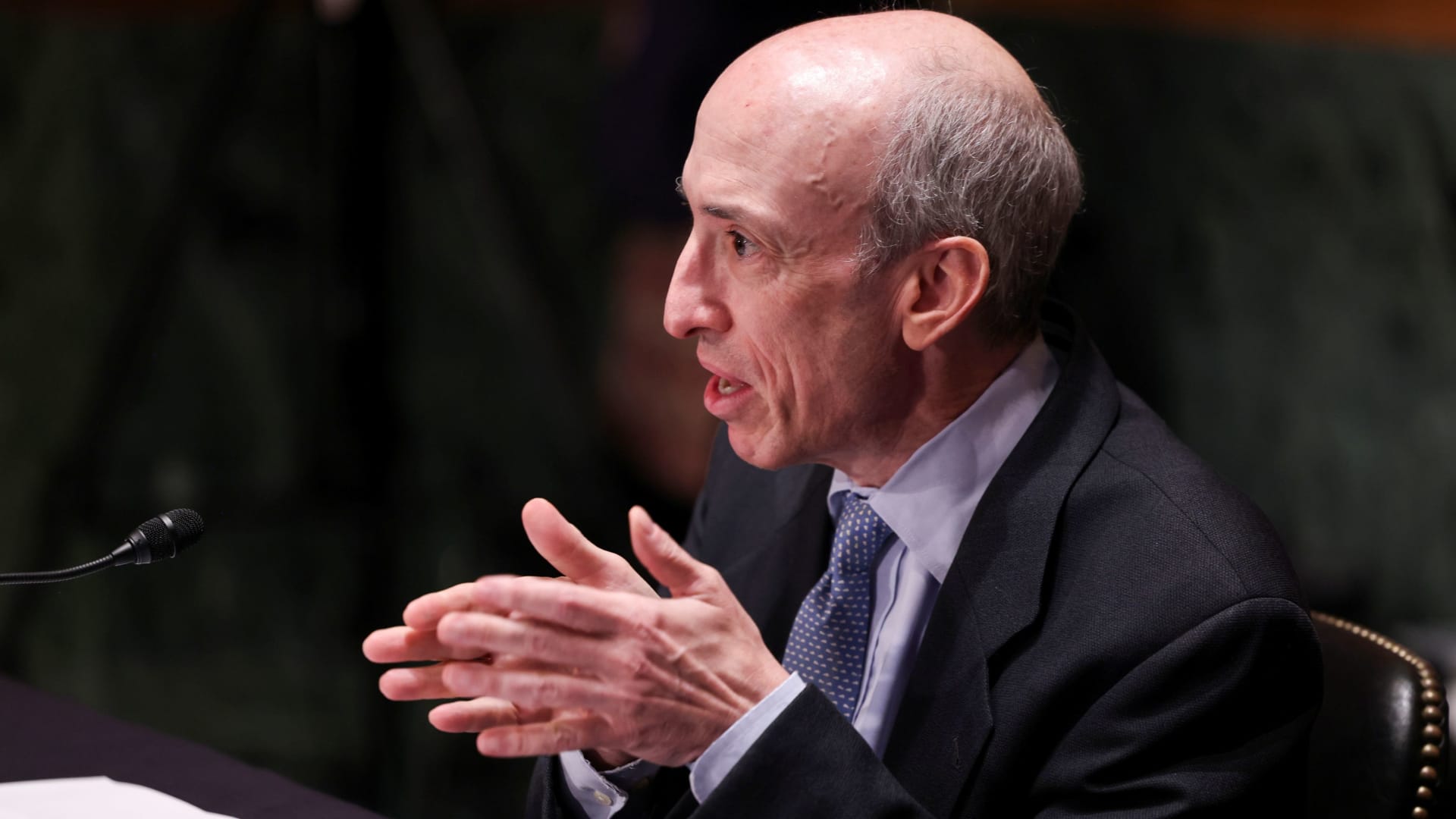
U.S. Securities and Exchange Commission (SEC) Chair Gary Gensler testifies before a Senate Banking, Housing, and Urban Affairs Committee oversight hearing on the SEC on Capitol Hill in Washington, U.S., September 14, 2021.
Evelyn Hockstein | Reuters
The Securities and Exchange Commission on Monday proposed two rules that would force more trading firms to register as dealers and open their books to far greater regulatory oversight.
The move, applauded by SEC Chair Gary Gensler, would require many firms that execute algorithm-based, high-frequency trades to come under the regulator’s scrutiny as it looks to ensure liquidity across U.S. financial markets.
“I was pleased to support this proposal because I believe it reflects Congress’s statutory intent that firms engaging in important liquidity-providing roles in the securities markets, including in the U.S. Treasury market, be registered with the Commission,” Gensler said in a statement.
The SEC’s new rules would require firms or persons to register as a dealer if they regularly make comparable purchases and sales of the same securities in the same day or turn profits primarily through bid-ask spreads.
Those who have at least $25 billion of trading volume in U.S. debt in at least four of the prior six months would also be compelled to register. People or firms that manage less than $50 million would not be subject to the new rules.
“This is the SEC’s effort to deal with the shadow dealer system,” said Ed Yardeni, president at Yardeni Research. “They’ve basically said — thanks to high-frequency trading, algorithms and so on — that there are firms out there that basically have taken on the role of being dealers in the sense that they transact an enormous amount of buying and selling on any specific day.”
In the past, firms that offered to buy and sell securities were not large enough — did not transact enough volume — to affect broader market liquidity. One firm’s trades, even if they involved thousands of U.S. bonds or corporate shares, simply were not large enough to be considered systemically important.
But now, as a handful of these so-called principal trading firms now control most of the volume on interdealer broker platforms in the Treasury markets, the SEC is worried that computer-based traders now act as a significant source of market liquidity.
Russell Sacks, a partner at law firm King & Spalding, said he thinks the real consequence of the rules would be in mandating that large private funds to register as dealers.
“What they’re saying is, if you are a large enough private fund such that you provide liquidity to other market participants on a regular basis, you should register as a dealer,” Sacks said Monday afternoon. “The entities that are in the crosshairs here are the pools of money run by what we’d refer to as hedge fund managers and pension funds.”
Sacks, whose clients include broker-dealers, added that he’s skeptical that the SEC would gain enough insight into market liquidity through the rules to warrant imposing such steep costs on large private funds.
“All of these entities already use prime broker-dealers to make their trades, and those entities are already subject” to the SEC’s rules, he added.
Since market liquidity, the ease with which assets can move throughout the economy, is critical to price stability and financial plumbing, the SEC has in the past asked firms that serve that function to register as “dealers.”
“Requiring all firms that regularly make markets, or otherwise perform important liquidity-providing roles, to register as dealers or government securities dealers also could help level the playing field among firms and enhance the resiliency of our markets,” SEC Chair Gensler added.
When investors worry about the liquidity of Treasury debt, or cash drying up, it can lead to huge and potentially dangerous price swings. The SEC on Monday alluded to such “tremors” in the markets for U.S. debt in 2014, 2019 and at the beginning of the Covid-19 crisis.
Liquidity concerns forced the Federal Reserve to step into financial markets in the spring of 2020 to meet banks’ fierce demand for central bank cash in exchange for Treasury debt, a global backbone that serves as a conduit for everything from hedged trades to monetary policy.
“The Treasury market is widely viewed as the gold standard of the credit markets,” Yardeni added. “We want to make sure that that market, in particular, stays liquid and continues to function.”
“You don’t want to call somebody that you’re trying to do a transaction with and find out that they’re not answering their phone,” he added. “And you don’t want to put in an order and find that it hasn’t been executed or it gets executed at a price bizarrely different than what you anticipated.”





